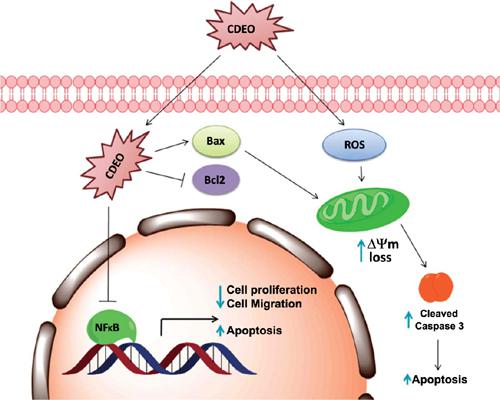Current Topics in Medicinal Chemistry ( IF 2.9 ) Pub Date : 2020-08-31 , DOI: 10.2174/1568026620666200722120826 Madhulika Bhagat 1 , Ajay Kumar 1 , Renuka Suravajhala 2

|
Aims: The aim of this study is to explore essential oil from the bark of Cedrus deodara (CDEO) as an potential anticancer agent.
Background: The frontline drugs against cancer in clinical settings are posing challenges of resistance and other detrimental side-effects. This has led to the exploration of new anticancer chemical entities from natural sources, particularly plant-based products such as essential oils that serve as vast repositories of pharmacologically active substances for combating cancer.
Objective: The objective is to isolate and characterize the essential oil from the bark of Cedrus deodara (CDEO) and evaluate its potential as an anticancer agent and delineate the possible underlying mechanism of action.
Methods: Cedrus deodara essential oil from bark (CDEO) was obtained by hydro-distillation and analyzed by GC/MS for vital constituents. Further, in vitro cytotoxic potential was measured by MTT assay against a panel of cancer cell lines. The apoptosis-inducing potential of CDEO was analyzed by mitochondrial membrane potential loss (ΔΨm) and nuclear fragmentation assay. Besides, wound healing assay and colonogenic assay were employed to check the anti-metastatic potential of CDEO. Molecular docking approaches were employed for target identification, while immuno-blotting was carried out for target validation.
Results and Discussion: The major components identified were 2-(tert-Buyl)-6-methyl-3-(2- (trifluoromethyl) benzyl)imidazo [1,2-a]pyridine (26.32 %);9- Octadecenoic acid (8.015 %); Copaene (5.181 %);2-(4-Methoxy-2,6-dimethylphenyl) -3-methyl-2H- benzo[g]indazole(4.36 %) and 9(E),11(E)- Conjugated linoleic acid (4.299 %). Further, potent in vitro cytotoxic activity with IC50 values of 11.88 μg/ ml and 14.63 μg/ ml in colon cancer cell lines of HCT-116 and SW-620, respectively. Further, a significant and dose-dependent decrease in colony formation, cell migration, induction of ROS formation and loss in ΔΨm was observed. Additionally, major compounds identified were chosen for ligandprotein binding interaction studies to predict the molecular targets in colon cancer. It was observed that compounds such as 9-Octadecenoic acid;4H-1- Benzopyran-4-one, 3-(3,4-dimethoxyphenyl)-6,7- dimethoxy; 2-(4-Methoxy-2,6-dimethylphenyl) -3-methyl-2H-benzo [g]indazole and 2-Bornanol,5-(2,4- dinitro phenyl) hydrazono have a prominent binding affinity with NF-κB. This was also further validated by immuno-blotting results wherein CDEO treatment in colon cancer cells led to the abrogation of NFκB, and the Bcl-2-associated X protein (Bax): B-cell lymphoma (Bcl)-2 ratio was up-regulated leading to enhanced cleaved caspase 3 formation and subsequent apoptosis.
Conclusion: These results unveil CDEO inhibits cell proliferation and induces apoptosis in colon cancer cells, which can be attributed to the abrogation of the NFκB signaling pathway.
中文翻译:

雪松杜达拉(树皮)精油通过抑制核因子κB诱导人结肠癌细胞凋亡。
目的:本研究的目的是探索雪松(Cedrus deodara)树皮(CDEO)树皮中的精油作为潜在的抗癌剂。
背景:临床上用于治疗癌症的一线药物对耐药性和其他有害副作用提出了挑战。这导致人们从自然资源中探索出新的抗癌化学实体,尤其是植物基产品,例如精油,这些精油可作为抗癌药理活性物质的大仓库。
目的:目的是从雪松(Cedrus deodara)树皮(CDEO)的树皮中分离和鉴定精油,并评估其作为抗癌剂的潜力,并描述可能的潜在作用机理。
方法:通过水蒸馏法从树皮中提取雪松雪松精油(CDEO),并通过GC / MS分析其中的重要成分。此外,通过MTT测定针对一组癌细胞系测量了体外细胞毒性潜力。通过线粒体膜电位损失(ΔΨm)和核碎裂分析来分析CDEO的诱导凋亡的潜力。此外,通过伤口愈合试验和结肠癌试验来检测CDEO的抗转移潜力。分子对接方法用于靶标鉴定,而免疫印迹法用于靶标验证。
结果与讨论:鉴定出的主要成分为2-(叔丁基)-6-甲基-3-(2-(三氟甲基)苄基)咪唑并[1,2-a]吡啶(26.32%); 9-十八碳烯酸( 8.015%); 钴(5.181%); 2-(4-甲氧基-2,6-二甲基苯基)-3-甲基-2H-苯并[g]吲唑(4.36%)和9(E),11(E)-共轭亚油酸( 4.299%)。此外,在HCT-116和SW-620的结肠癌细胞系中,IC50值分别为11.88μg/ ml和14.63μg/ ml的有效体外细胞毒性活性。此外,观察到菌落形成,细胞迁移,ROS形成的诱导和ΔΨm的损失的显着且剂量依赖性的降低。另外,选择鉴定出的主要化合物进行配体蛋白结合相互作用研究,以预测结肠癌的分子靶标。观察到化合物如9-十八碳烯酸; 4H-1-苯并吡喃-4-酮,3-(3,4-二甲氧基苯基)-6,7-二甲氧基; 2-(4-甲氧基-2,6-二甲基苯基)-3-甲基-2H-苯并[g]吲唑和2-硼烷醇,5-(2,4-二硝基苯基)肼基与NF-κB具有显着的结合亲和力。免疫印迹结果也进一步证实了这一点,其中在结肠癌细胞中进行CDEO处理导致NFκB的废除,并且Bcl-2相关X蛋白(Bax):B细胞淋巴瘤(Bcl)-2的比例升高了-调节导致增强的裂解半胱天冬酶3形成和随后的细胞凋亡。
结论:这些结果揭示了CDEO抑制结肠癌细胞的增殖并诱导其凋亡,这可归因于NFκB信号通路的废止。











































 京公网安备 11010802027423号
京公网安备 11010802027423号